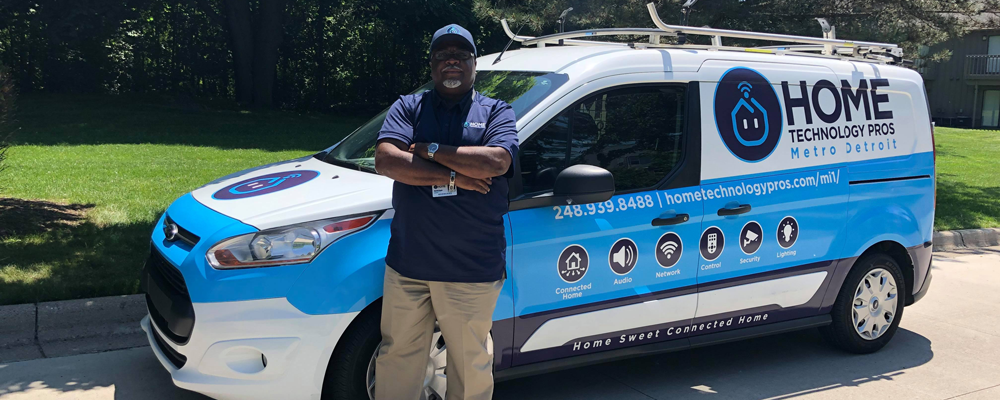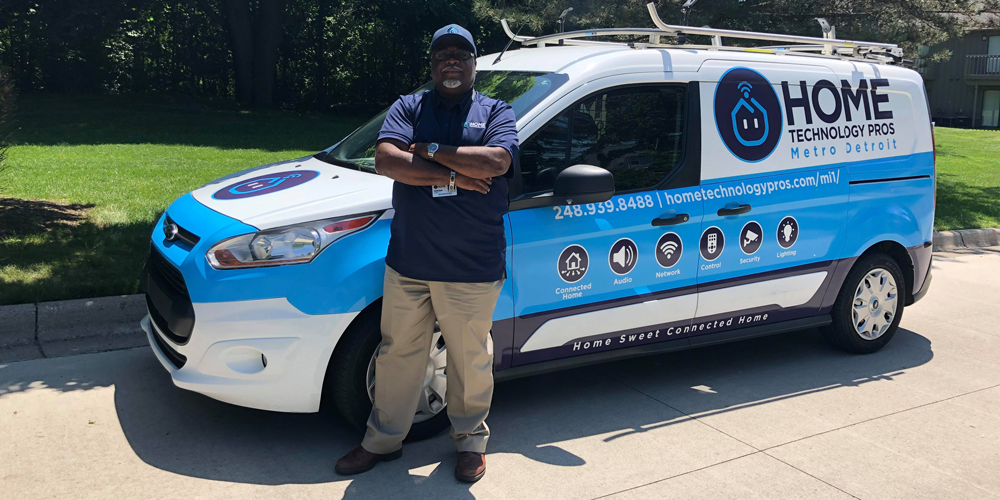
by Shari Noland | Sep 29, 2019 | Faith & Work |

Derrick Davis in front of his Home Technology Pros of Metro Detroit business truck.
When Derrick Davis launched his television career as a video engineer 35 years ago, it wasn’t uncommon for him to be the only brother on the production truck crew. Things haven’t changed much as he travels to various venues all around the country at 57, still in the field covering network sports as a broadcast maintenance engineer for WXYZ-TV in Detroit, an ABC-TV affiliate. Davis wants to change that. He promised his late father he would.
“You know what, you’ve got to stop complaining and do something about it. God Blessed you with a gift. Now that you know what that gift is and your purpose, why don’t you start training young people to do what you do?'” Davis recalls his dad Maurice telling him.
Davis pondered the idea for decades, strategizing with this dad over the years on how to make that kernel of insight into a feasible concept. He had a lot of ups and downs, setbacks and heartbreaks before soaking his 401K and feverishly saving for five years. In 2019, he launched a technology school, The AV Technology Institute, and a companion franchise business, Home Technology Pros of Metro Detroit. The goal of the Detroit-based school is to help young people who aren’t college-bound and are struggling with what they want to do in life. Many of Davis’ potential students will soon be entering the workforce out of high school or possibly coming out of the prison system. The franchise, which helps people install home theater systems, home networking and more, will give those who finish his program the opportunity to gain hands-on experience as interns. Unfortunately, his dad died before he could see the vision become a reality.
“Literally three days before he passed, we were sitting at the kitchen table, and out of the blue he said, ‘Did you start that school yet?’ and I said, ‘no,'” Davis recalls.
His dad responded, “What are you waiting for?”
Davis answered him, “I don’t know.” That conversation, so close to his dad’s death, haunted Davis and spurred him into action. “From that point on, I made it my sole mission to make sure that I got this tech school off the ground to give back to the community. I have funded everything I’ve done thus far. It’s all or nothing, and I believe it’s for the glory of God to do what He promised me, that vision that He set in me.”
The idea of being an educator was a hard one to adjust to, even though his dad, a pastor, and former middle school band director, had told him previously that it was in his DNA. Davis’ mom, who also has passed away, was a second-grade teacher. Several people in his family are educators, principals, teachers, and counselors.
His hesitation possibly was because Davis himself struggled in school.
“I was labeled the black sheep in the family. I was the most likely not to succeed. But I used that as a sense of motivation. The TV station that I work for is literally a half-mile from the high school where I graduated from,” said Davis, who turned a negative comment from a school counselor into motivation for success after he completed a career assessment test that revealed he could not be the cameraman he aspired to be. The counselor advised him to be a food service worker or a dietician. “I gave her a few choice words, got kicked out of school, got home, and told my dad the counselor said I couldn’t do what I wanted to do because I’m not qualified.” His dad understood his frustration and didn’t get upset with him about the incident. Even his mom saw in him what a lot of people didn’t. “She knew that I wasn’t a book genius, but she also knew I wasn’t stupid either.”
It took Davis awhile to find his way after high school. He went on to attend Tennessee State Unversity for two years, followed by earning a certificate in Radio and Television Production from the Nashville School of Broadcasting. He decided to join the Navy and was able to obtain a Certificate in Electronic Technology while there through correspondence courses.
“As a radioman in the Navy, I dealt with the radiofrequency transmission. That’s where my interest in electronics started. I worked quite a bit alongside electronic techs on the ship, and they mentored me along,” said Davis, who said that after four years in the Navy he decided to take his chances in civilian life. He worked at Dow Chemical for ten years but stayed involved in community television as a volunteer. Davis’ first TV gig was as a master control operator, and he was able to climb the ladder into roles of increasing responsibility. Now married with kids, he went back to school part-time and after six years earned a bachelor of science degree in electronic engineering technology from the New England Institute of Technology.

Inside a classroom at the AV Technology Institute.
“It wasn’t easy…it was a struggle. I learned so much by having mentors, guys that were my supervisors or ahead of me and working hands-on in the field. You learn more when you are actually doing the job than when you are reading about a job. But my degree helped me advance my career. It helped me 20 years later get into the television station that I was told I never could get in to as a kid,” said Davis. He has four adult children and six grandchildren, and his 28-year-old son Deshon is following in his footsteps. “Today, he’s me. He does network sports, doing the same job I did when I got out of the Navy. He started from the bottom as a utility guy pulling cables and worked his way up.”
Davis’ school is in a building owned by the nonprofit Life Remodeled, which repurposed a former elementary school building into a hub of educational and vocational organizations for children, students, and adults in the community called the “Durfee Innovation Society.” In the building, Davis has two classrooms for lab work and instruction. However, his Home Technology Pros of Metro Detroit business is a virtual office and a truck.
“Right now, our country is leaning back to trade schools and trades. That was a missing demographic for years. Everybody pushed college, college, college. This is a basic low-voltage technology that builds the foundation. If you catch on and you are serious about it, you will run with it and take it to the next level,” said Davis, who, in honor of his parents, has an annual scholarship fund dinner to provide resources for aspiring young adults seeking a career in technology. “It’s been a lifelong struggle for me, but I’m blessed. I can’t complain. I thank God every day for His mercy and His grace for what I’ve been through and where I’m at now.”
by Wil LaVeist | Aug 14, 2012 | Feature, Headline News |

MISSION ACCOMPLISHED: Engineers at NASA’s Jet Propulsion Laboratory in Pasadena, California, celebrate the Aug. 6 landing of NASA’s Curiosity rover on the planet Mars. (Photo: NASA)
On August 6, when the Mars rover Curiosity managed a text-book landing on the red planet, I was as thrilled and enthralled as anyone else who watched the tension in that NASA control room transform into unrestrained joy once the engineers realized that their project was a success. For me, though, watching the jubilation in that room was also bittersweet. As an American I felt the pride and amazement of this great accomplishment in space, but as an African American I was stung by the lack of black faces celebrating in the NASA control room.
According to the National Center for Education Statistics, the number of graduates with STEM (science, technology, engineering, mathematics) degrees has been declining nationwide, but it’s particularly alarming for blacks. African Americans represent 12 percent of the U.S. population, but 2009 received only “7 percent of all STEM bachelor’s degrees, 4 percent of master’s degrees, and 2 percent of PhDs.” Education, of course, goes hand in hand with our economic wellbeing. With black unemployment twice as high as that of whites, pursuing STEM careers is an opportunity that could dramatically improve black life for generations to come.
The black church should use its influence to awaken parents and encourage young people to pursue STEM education. In addition to the economic benefit, STEM fields are about the study of God’s creations — the universe, the Earth, and all life forms. Emphasizing STEM in this context at church and the community could channel the natural curiosities of young people in a positive direction. It could help them to see and experience God not as some elusive being beyond the clouds but as a deeper, loving ever-present Spirit who is concerned about their everyday lives.

WELL DONE: On Aug. 13, President Obama made a special phone call to congratulate NASA’s Curiosity Mars rover team. (Photo: Pete Souza/Official White House Photo)
If a kid in the ’hood or the ’burbs can master the physics required to consistently shoot a rubber sphere into a 10-foot-high cylinder or mix and sync the sonic wavelengths of hip-hop beats to precision, they also can achieve in math and science classes. STEM is at the root.
As a youth growing up in the late 1970s, my curiosity in God was actually stirred more by watching reruns of the original Star Trek than sitting in wooden pews enduring long, dry, abstract sermons. Star Trek offered many lessons about how science could be used to help solve human problems and lead us to a better understanding and relationship with Jesus Christ. Star Trek also depicted blacks as intelligent leaders rather than the buffoons I often saw on other TV shows. (As an aside, some years ago I met Nichelle Nichols, who played the original Lieutenant Uhura, at an event in Phoenix, Arizona. I told her that as a youth I was in love with her because she tucked me in bed most nights as I fell asleep after watching Star Trek. She laughed and gave me a big hug.)
One of my favorite Star Trek episodes was “The Ultimate Computer.” Dr. Richard Daystrom, a black man (actor William Marshall), developed the M5 Multitronic Unit, a computer designed to run a 430-crew starship with just 20 crewmembers. The M5 was to replace a commander, such as Captain James T. Kirk. Humans would no longer die at war but could channel their intellect and spirit toward higher pursuits.
M5 thought like a human because Daystrom had implanted M5 with his own human neural engrams. It was tested under a war games scenario, while Kirk sat at the helm observing. After performing flawlessly, M5 hit a glitch and ended up blasting other starships, killing crew members. Daystrom experienced a mental breakdown while trying to talk M5 out of committing more murders. Eventually Kirk reasoned with M5 by appealing to its (Daystrom’s) sense of guilt. M5 tells Kirk, “Murder is contrary to the laws of man and God,” and concludes that it must die for its sins. Even the computer understood God’s authority and submitted.
The outcome was unfortunate for Daystrom, but this 1968 episode revealed something extremely inspiring about the overall Star Trek series: Daystrom, a genius, was responsible for the design of ALL of the starship computers throughout the entire fleet. Imagine that — a black man!
The black imprint in space travel is not science fiction. From Benjamin Baneker, the first African American astronomer, to Guion “Guy” Bluford, the first black man in space, to Mae Jemison, the first black woman in space, African Americans have a long and strong legacy. And though it may not have been visually present in that jubilant NASA control room, it was there: NASA’s current leader, Charles Frank “Charlie” Bolden, Jr., is African American.
Editor’s Note: For more information on ways of encouraging student participation in science, technology, engineering, and mathematics programs, check out this report, “Increasing the Number of STEM Graduates,” from the Business-Higher Education Forum.






